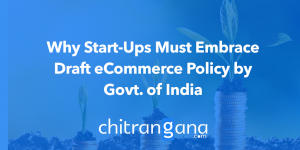
Ecommerce & Startups
Why Start-Ups Must Embrace Draft eCommerce Policy – view by Chitrangana.com
The Govt. of India’s new Draft eCommerce policy should serve as a shot in the arm to ambitious start-ups trying to compete with global giants such as Amazon and Walmart. Seeing as the policy is designed to benefit the Indian consumer and/or retailer, the Govt. of India deserves a ton of praise – Chitrangana.com
It’s not a well-kept secret, at least in industry circles, that international eCommerce players do everything within the rulebook to bypass the Indian taxation system. Registered in foreign countries, they are booking losses in India, before funnelling income out of the country in the name of technology development, marketing and license fees.
The new Draft eCommerce policy will support start-ups and the Indian business ecosystem. The policy has strongly recommended data localization, giving new firms a two-year sunset period to adjust before localization becomes mandatory. It has also advised direct and indirect tax incentives.
“Besides data localization, the policy, that has received staunch opposition from Flipkart and Amazon, has also proposed a single legislation to address all aspects of digital economy. While proposing a solitary regulator for issues related to consumer protection and FDI implementation, the draft has called for improvements in the legal fragmentation seen through several laws governing the Ecommerce sector.” said Mr. Nitin Lodha, Sr. eCommerce consultant at Chitrangana.com and industry veteran in India & UK.
Since the influx of eCommerce more than a decade ago, Indian start-ups have not received a level playing field. The policy will most definitely go a long way in helping them.
Mr. Vishal Shah, eCommerce Consultant for Corporate Assignments at Chitrangana.com mentioned, “In recent months, a number of Chinese eCommerce players, offering staggering discounts, began marketing in India but without the aid of post-sales customer support. These websites often mask themselves as Indian websites, using Indian advertisements and listing product prices in INR. However, they are not physically stationed in India and offer no customer support or postal address. Recent examples of such websites: aliexpress.com, banggood.com and many more. With the consumer becoming smarter by the day, it’s hard to foresee these websites thriving in the market.”
The Govt. of India, through its new Draft eCommerce policy, is doing everything in its power to endow local players such as Bharti Enterprises, Reliance Jio, TCS, Wipro, Ola, Snapdeal, MakeMyTrip, UrbanClap, Justdial, PepperFry, and Practo, besides start-ups trying to make inroads into the market. The policy, which was jointly drafted by officials from ministries of finance, home affairs, corporate affairs, and electronics and IT, could have a telling impact on the numbers from the next fiscal.
Watch our participation on news discussion our DD Network and Rajya Sabha TV : //www.chitrangana.com/Consultant/indias-new-draft-ecommerce-policy/


